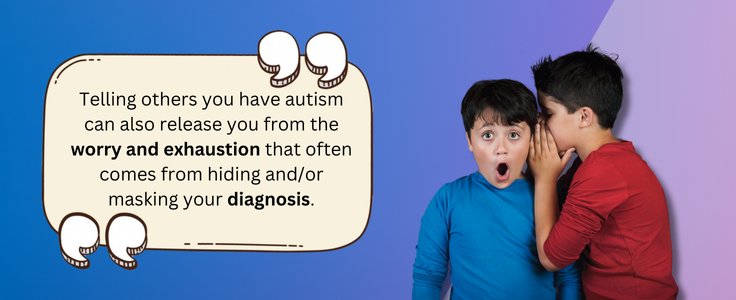Cómo decirle a alguien que tienes autismo
Las personas que padecen un trastorno del espectro autista (TEA) pueden tener dificultades para informar a otras personas sobre su diagnóstico de autismo. Pueden sentirse nerviosos, ansiosos y abrumados solo de pensar en decírselo a alguien nuevo, lo que puede hacer que la situación les resulte desalentadora.
Dicho esto, contar a otras personas tu diagnóstico de autismo puede ayudar a comprenderte mejor. Puede hacer que los demás sientan más empatía hacia los diferentes retos a los que te enfrentas, lo que puede conducir a una mayor aceptación e inclusión.
El hecho de que otras personas sepan que tienes autismo puede dar lugar a una mayor comprensión, lo que puede facilitar la comunicación, la socialización y la formación de relaciones significativas. Decir a los demás que tienes autismo también puede liberarte de la preocupación y el cansancio que suelen derivarse de ocultar y/o enmascarar tu diagnóstico.
Todas estas son buenas razones para querer contar a los demás que tienes autismo, pero ¿cómo hacerlo? Aquí tienes algunos consejos que pueden ayudarte a sentirte más cómodo.
Índice
Decidir a quién contárselo
Revelar su diagnóstico de autismo puede parecer una tarea aterradora. En parte puede deberse a que parece una empresa gigantesca dar a conocer a muchas personas tu trastorno del neurodesarrollo.
Una forma de aliviar parte de tus miedos y ansiedad podría ser empezar poco a poco. Antes de contárselo a nadie, piensa a qué personas quieres contárselo.
Haz una lista de todas las personas a las que crees que te gustaría contárselo y, a continuación, ordénalas por orden de prioridad en función de a quién te sientes más cercano, con quién te relacionas más y quién crees que podría aceptarlo mejor.
Empezar con unas pocas personas puede ayudarte a sentirte más cómodo contándoselo a más gente.

Decidir qué contar
También deberías pensar qué quieres contar a otras personas sobre tu diagnóstico y cómo quieres hacerlo. Puedes plantearte contarles cuándo te diagnosticaron por primera vez, qué significa y cómo te afecta personalmente.
Esta información puede ayudar a otras personas a comprender mejor tu trastorno, cómo te afecta en tu vida diaria y qué tipo de apoyo necesitas por ello.
También es buena idea dar a la gente la oportunidad de hacer preguntas. Esto no solo les ayudará a entenderte mejor a ti y a tu enfermedad, sino que también contribuirá a generar confianza y a estrechar las relaciones.
También debes tener en cuenta dónde y cuándo quieres contárselo a los demás. Intenta elegir un lugar tranquilo y alejado de otras personas para poder hablar de temas serios. Asegúrate también de que ambos disponéis de tiempo suficiente para mantener una conversación en profundidad, para que nada parezca precipitado.
Hable de cómo le afecta o no el autismo
Existen muchos conceptos erróneos sobre el autismo y el estigma que lo rodea. Por eso, cuando le dices a alguien que tienes autismo, es posible que no entienda muy bien lo que eso significa.
Algunas personas que no están tan formadas o informadas sobre los TEA pueden pensar automáticamente en los casos más extremos de autismo. Las imágenes que les vienen a la mente pueden no coincidir con lo que piensan de ti, sobre todo si tienes un caso más leve.
Por eso, cuando le digas a alguien que tienes autismo, también es importante que le cuentes no sólo cómo te afecta, sino también cómo no te afecta. En otras palabras, debes hablar no sólo de los retos a los que te enfrentas debido a tu autismo, sino también de los puntos fuertes que tienes, algunos de los cuales proceden de la misma afección.
Cómo explicar el autismo a hermanos, amigos y familiares
Al arrojar luz sobre estas dos cosas, ayudas a los demás a entender por lo que estás pasando. Además, también les ayuda a abrir los ojos ante el hecho de que el autismo afecta a las personas de formas muy diversas.
Puedes llevar esta parte de la conversación un paso más allá diciendo a los demás cómo pueden apoyarte si lo necesitas. Puede ser algo tan sencillo como pedir un poco más de gracia si no captas las señales no verbales de alguien o parece que estás siendo distante. Involucrar directamente a los demás de esta manera también contribuirá a generar comprensión y respeto.
Blue Gems ABA ayuda a crecer a los niños con autismo
Desde luego, no es fácil decirle a alguien que tienes autismo. Sin embargo, hacerlo puede ayudarte a liberarte de parte del estrés y la ansiedad que puedas estar reteniendo, y también a conseguir la ayuda y el apoyo de personas en las que confías y con las que te relacionas a menudo.
En Blue Gems ABAnos dedicamos a ayudar a los niños con autismo a crecer para que puedan llevar una vida feliz, sana e independiente. Para ello, aplicamos el análisis conductual aplicado o terapia ABA.
Este planteamiento científico del aprendizaje y el comportamiento ayuda a los niños autistas a desarrollar las habilidades comunicativas, sociales y de la vida diaria con las que suelen tener dificultades.
Para más información Contacto hoy.




